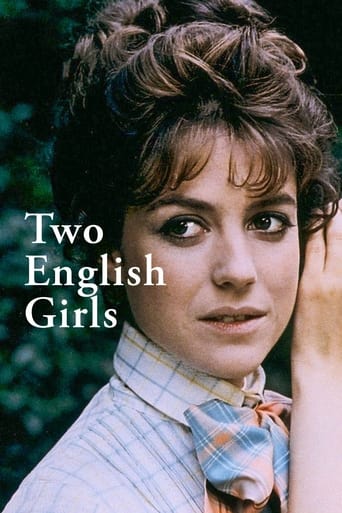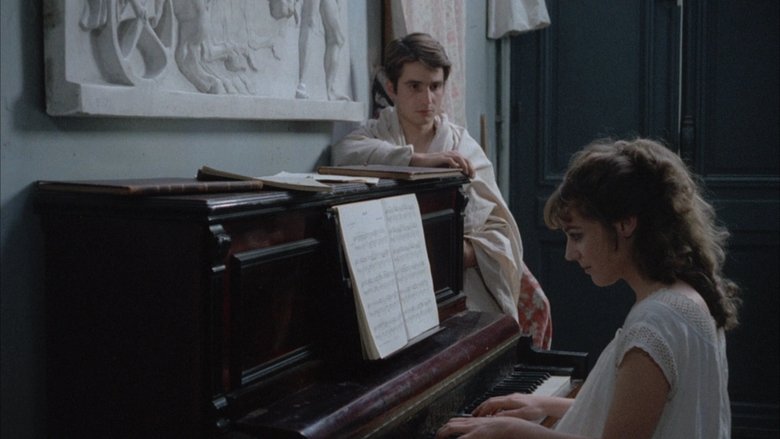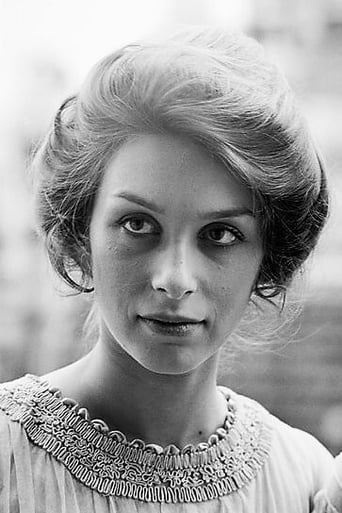Two English Girls (1972)
At the beginning of the 20th century, Claude Roc, a young middle-class Frenchman, befriends Ann, an Englishwoman. While spending time in England with Ann’s family, Claude falls in love with her sister Muriel, but both families lay down a year-long separation without contact before they may marry.
Watch Trailer
Free Trial Channels
Cast


Reviews
Best movie ever!
Very interesting film. Was caught on the premise when seeing the trailer but unsure as to what the outcome would be for the showing. As it turns out, it was a very good film.
I wanted to like it more than I actually did... But much of the humor totally escaped me and I walked out only mildly impressed.
It's an amazing and heartbreaking story.
In the end of the Nineteenth Century, the English teenager Ann Brown (Kika Markham) travels from Wales to Paris and befriends the French Claude Roc (Jean-Pierre Léaud) and she invites him to visit her hometown, where she lives with her mother (Sylvia Marriot) and her younger sister Muriel (Stacey Tendeter). When Claude arrives at her home, Ann and Muriel become close friend of Claude, but Ann pushes Claude towards Muriel and they fall in love for each other. However their mothers propose a separation during one year without any communication between them to make them sure about their real feelings. But after six months in Paris, Claude is seduced by many love affairs and sends a letter to Muriel calling off their commitment. When Claude meets Ann in Paris later, they have a love affair; but Claude still has feelings for Muriel. "Les Deux Anglaises et le Continent" is a pointless and dull romance with a melodramatic triangle of love that recalls a soap-opera most of the time. The cinematography, sets and costumes give a beautiful reconstitution of the period; the gorgeous Kika Markham and Stacey Tendeter have great performances; but the excessive narrative of the obvious is irritating and the feature could be shorter. My vote is seven.Title (Brazil): "As Duas Inglesas e o Amor" ("The Two Englishwomen and the Love")
Two English Girls and the Continent belongs to what I privately call "the other Truffaut"; this wouldn't be the place to specify why I consider some of Truffaut's films (The Four Hundred Blows; Stolen Kisses; The Wild Child; Domicile conjugal; The Story of Adele H; The Man Who Loved Women; The Green Room; The Last Metro) as belonging to a pretty distinct class that I have titled: the other Truffaut. Notwithstanding, Truffaut's corpus is remarkable as one of the most astonishingly beautiful works of his century.Truffaut's cinema is the complement and the result of a very particular and highly differentiated world-view. In a genuine and authentic way, he was aware of his singularity. One of his aimsor rather of his meansof his deliberate meanswas to tell dirty things in an ingenuous, naive and gentlemanly way.Truffaut used stylized narrative forms to explore the substratum of the couple relations. He did this in even a more deliberate way than the movie authors he promoted in the '50s. Yet his approach is not a spoofing one; his exoticism isn't mockexoticism; it is related to some ancient forms of the French culture, to some metarealist traditions. To a certain Renoir (the one that didn't pretend to be naturalistic or Zolist, but who crafted exquisite _divertissements). It's not that Truffaut's picturesque is a fake one; it is strictly subordinated.In Truffaut's case, a quite peculiar world-view got the chance of a full, direct expression. What is this quality of Truffaut?What is the gist of Truffaut's art?Some have expressed it in indirect or inappropriate or even hostile way;they felt that particular quality; yet their perception is clumsily or inimically expressedso with Antonioni, who disliked Truffaut's softness and tenderness and feminineness ,if one might say so.Mrs. Deneuve, who was Truffaut's mistress (they had no children together), spoke about Truffaut's feminine side or perception. I do not think this is properly expressed.What needs to be indicated is his delicacy, subtlety, freshness, fineness, gentleness, mildness, and his frank tactfulness.His subtle, smooth irony, his civilized ,polished and indiscreet humor, his highly humane quality in exposing and defining in artistic terms the secret substratum of the human relations, of the desire and of the loneliness and alienationwith a sense of the piquant. As in J&J, whose declared complement it is, this approach helps, enables Truffaut to narrate with due smoothness and finesse a disturbing and twisted story. The same shamelessness, the same suavity.Truffaut has a very cute topic for his movie:--the feminine masturbation (and a dose of lesbianism), at the little girls (needless to say that such things are still strictly taboo for most of the mainstream cinema );--then the _defloration.As some other Truffaut films, TEG contains some piquant nudity and sexuality.A word about the beauty of Truffaut's actors:--a beauty that is generally mild and unobtrusive and discreetyet very physical and subtly sensual and bodily (Jean-Pierre Léaud,Kika Markham,Stacey Tendeter,Marie Mansart). One more thing to be spoken of:this one is a period movieand consequently there is a fair amount of a certain _colorist instinct, joy and gustothat I will leave the pleasure to my fair reader to discover for him/herself. Truffaut flirted here somehow with a certain trend of aestheticism and stylization that are customary in the period films. (One can perceive the trepidation of the _erotography of the epochthe interest for this kind of literary production.) On the other hand, Truffaut's huge interest in making such period films is the pendant and the complement of his studious love for a certain class of literature. Truffaut was, one knows it, such a good reader . (On the other hand,when he adapted a book, that book was never a mere pretext; on the contraryit was the hallmark. Truffaut adapted only things that he respected. One sees that is not true about, say, Welles or Hitchcockwho go beyond the literary pretext; Truffaut reveres the book, he deepens it, he remains true to it.)The beauty of the main actors; the finesse; the writer loved by Truffaut; the twisted content; the indiscreet topic of masturbation and bodily life; the hidden substratum; the tactfulnessI hope my fair readers will give this very fine movie the esteem it deserves. Truffaut's stylizations are strictly functional; they are never vain, useless decorations; they wholly belong to the style and are directed towards the movie's meaning and are fully adequate.Truffaut is as true, as authentic as he is smooth and elegant. Through the stylistics of the social life, he reached the stylistics of the inner life.I would include Two English Girls and the Continent in a list of Truffaut's best tenor maybe even five!movieswith Jules et Jim (1962), The Soft Skin, Mississippi Mermaid, Vivement Dimanche! (1983) .
Puzzling and somewhat pointless drama from Francois Truffaut has a young Frenchman at the turn of the century traveling to Wales to meet with his new girlfriend and her family; once there, he finds himself falling in love with his girlfriend's troubled sister (seems sis is a bit neurotic about her own virginity, wearing it both as a badge of honor and as an angry embarrassment). Dulled-out, inert rumination from a novel by Henri-Pierre Roche, though many critics gave it raves. Hurt overall by colorless performances, bad art direction and a severely long running time. Truffaut added more footage for a 1984 re-release, taking it from 108 minutes to a now-astounding 132 minutes. *1/2 from ****
This movie is based on a novel. This is a very important fact. The opening credits show us the novel, presumably so that we will all know what a book looks like. To emphasise the fact that this is a movie based on a novel, there is lots of narrative voice-over. The voice-over is helpful for those of us who cannot see the screen. It describes what is going on on screen, and it also describes what is going on in the characters' minds, presumably because for some reason the director has no other means of letting us know what is going on in their minds. And the voice-over is rather tedious just like the way I'm writing this is tedious. No, seriously, it's awful. The French guy is staying with the two English girls and their mother, and as the camera shows us 1 French guy, 1 English girl, and 1 mother at dinner, plus 1 empty chair, the voice-over tells us the other English girl isn't there. We watch them eat in silence. The voice-over tells us they ate in silence. It got to the stage where the voice-over said something about them (out for a walk) coming to a rushing torrent. My own personal voice-over said "If I see a rushing torrent in the next two seconds, I'm out of here". Bingo! Of course, this all wouldn't be so bad if the story itself was particularly interesting, but, as judicious use of the fast-forward button made clear, it's just your standard tedious French drivel that claims to have the last word about human relationships. Some movie adaptations you can dismiss as "better off just reading the book", but with this one you're better off reading a book on a different topic by a different author. (Note added later: I subsequently have seen a couple of Eric Rohmer films and didn't like those either! So I concede that there's a particular type of movie that I hate: the French philosophical relationships movie).








